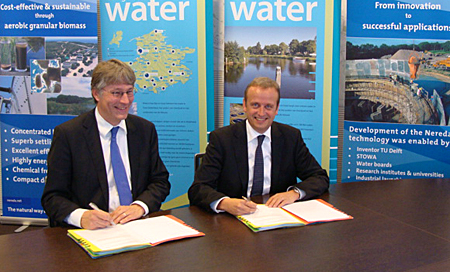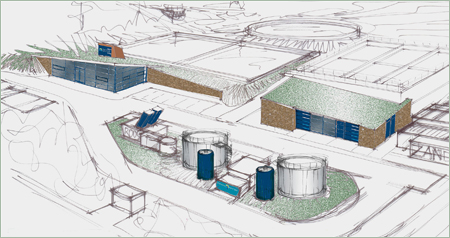WWTP Dinxperlo turned into public water garden with latest Nereda water treatment technology
Water board Rijn & IJssel signed a contract with engineering and consultancy firm DHV to replace its outdated waste water treatment plant Dinxperlo by a completely new one, using the energy and space saving Nereda technology. The contract represents a value of approximately 8 million euro.
Upgrading of former landfill site
Construction of the new plant will be integrated in the Brüggenhütte spatial plan in which the water board and municipality of Aalten are jointly turning a former waste disposal site into a public water garden and green area.
Smaller footprint and energy saving
The selection of the Nereda technology enabled the water board Rijn & IJssel to build an efficient new plant, requiring a far smaller footprint. Philip Schyns, project leader at the water board: "Besides needing less space, this technology will enable us to save energy and costs in the longer term. These advantages have knock-on benefits for efficiency and the environment."
The strength of the Nereda technology lies in special bacteria that grow in concentrated and fast settling granules. Conventional methods of treating wastewater use bacteria in fluffy flakes, which take much more time to separate from the treated water.
Attractive water garden
The water board attaches importance to corporate social responsibility, efficiency (particularly energy efficiency), sustainability and cooperation. There is close collaboration between the water board and Aalten municipality to create an attractive area in tandem with construction of the new treatment plant.
The Nereda-treated wastewater is going to flow into attractive parcels of water and reeds through a public water garden.
DHV board member Piet van Helvoort states: "Internationally this technology is regarded as a breakthrough in wastewater treatment and the expectation is that the technology will become the new global standard."
State-of-the-art: aerobic granular biomass
Nereda is an innovative state-of-the-art biological wastewater treatment technology that purifies water using the unique features of ‘aerobic granular biomass’. Contrary to conventional processes, the purifying bacteria concentrate naturally in compact granules, with superb settling properties.
As a result of the large variety of biological processes that simultaneously take place in the granular biomass, Nereda is capable of producing excellent effluent quality. Even when not particularly targeted, extensive biological phosphorus and nitrogen reduction is an intrinsic attribute of this technology, resulting generally in chemical-free operation.
The first full scale Nereda installation for municipal waste water is under construction at WWTP Ede, the Netherlands and expected to be commissioned soon. A number of demo installations with Nereda technology is already operational in the Netherlands, Portugal and South Africa. For the treatment of industrial waste water, several Nereda installations have been commissioned since 2006.
This news items was originally published on the website of DHV.
DHV.
More information
DHV
Amersfoort, the Netherlands
Ronald Niermans, Project Manager
E ronald.niermans@dhv.com T +31 33 468 37 70
www.dhv/nereda.com





